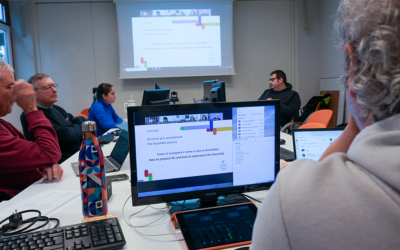 “Cultivating and caring for creation is an instruction of God which he gave not only at the beginning of history, but has also given to each one of us; it is part of his plan; it means taking responsibility to make the world increase, transforming it so that it may be a garden, an inhabitable place for us all (. . .) Human and environmental ecology go hand in hand.” These words from Pope Francis on June 5, 2013 bear witness to very current environmental issues.
“Cultivating and caring for creation is an instruction of God which he gave not only at the beginning of history, but has also given to each one of us; it is part of his plan; it means taking responsibility to make the world increase, transforming it so that it may be a garden, an inhabitable place for us all (. . .) Human and environmental ecology go hand in hand.” These words from Pope Francis on June 5, 2013 bear witness to very current environmental issues.
These are not far-off concepts at the Am Spiegeln Centre in Vienna – . In fact, the centre of the Focolare Movement in Austria was originally planned around the human person and the natural environment. Located at the foothills of the Vienna woods, ten minutes away from the Schonbrunn Palace, the summer residence of the Hasburgs and surrounded by greenery, the Mariapolis Centre is a favourite destination for conferences and conventions. But it is also much sought after as a place of rest, summer holidays and tourism, thanks to its proximity to the splendid capital. Thousands of visitors (families, children, young adults and groups) have been welcomed by the centre over the years.
 The award was conferred on the Mariapolis Centre on January 16, 2014, by the Austrian Minister of the Environment, and the Chamber of Commerce. The Austrian Seal for Respect of the Environment recognizes efforts to modify physical infrastructures in order to preserve water and energy by installing appropriate systems, and sorting waste for the purpose of reuse. By using a new logistic for the collection of waste, a substantial amount of it can be recycled. In addition, there is modest use of detergents, a reduction in packaging materials and ongoing employee training. The award also recognizes using food and other resources from the local region.
The award was conferred on the Mariapolis Centre on January 16, 2014, by the Austrian Minister of the Environment, and the Chamber of Commerce. The Austrian Seal for Respect of the Environment recognizes efforts to modify physical infrastructures in order to preserve water and energy by installing appropriate systems, and sorting waste for the purpose of reuse. By using a new logistic for the collection of waste, a substantial amount of it can be recycled. In addition, there is modest use of detergents, a reduction in packaging materials and ongoing employee training. The award also recognizes using food and other resources from the local region.
The centre administrators added: “It is also important to involve our guests by providing them with good information about using the structure. This is in contrast with a throw-away culture of waste, and favours the wellbeing of both our guests and the local environment.”
In conclusion: “For us, this award highlights the witness of Gospel living that we try to offer here each day. And this translates into living in harmony with and protecting God’s creation. If you’d like to try it for yourselves, we’re waiting for you at Am Spiegeln!”





0 Comments